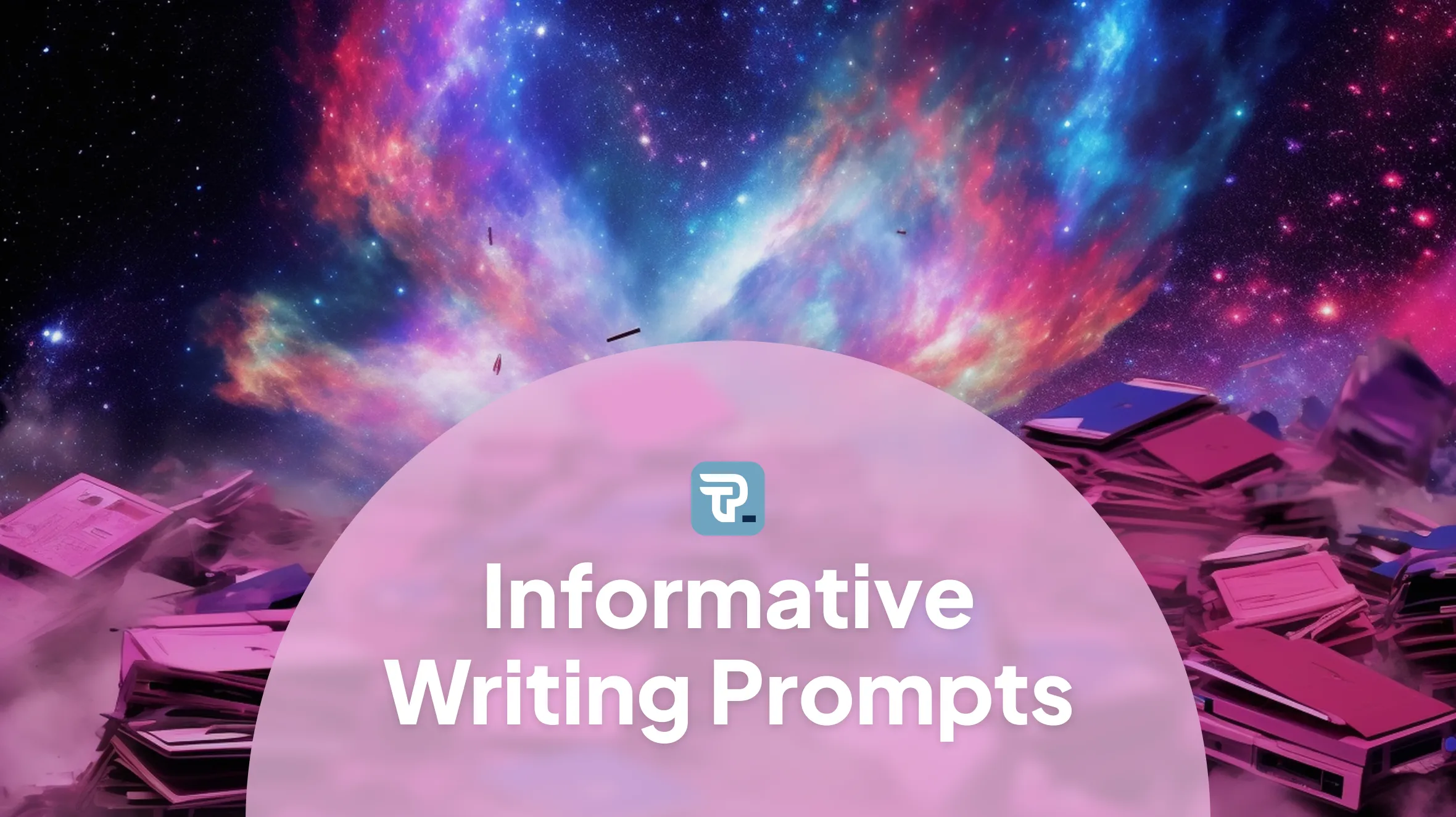Informative writing is exactly what the name suggests. It’s more commonly referred to as “expository,” but the purpose stays the same: to explain, describe, or clarify a topic using clear facts, examples, and evidence.
Unlike persuasive essays, which teach students to argue their point using compelling evidence, expository essays give them a chance to master presenting facts clearly and logically so the reader learns something new. But in a school setting, it’s all about the writer: they get to both practice their writing skills and explore an important new topic in depth.
For example, middle school informative writing prompts are a great opportunity to help students understand things like how volcanoes erupt, why we have different seasons, or how the internet works. In turn, high school informative writing prompts typically deal with more complex topics: the impact of social media on mental health, the science behind climate change, etc.
Picking a good topic for a middle or high school-level informative essay can be tricky, though. That’s why we’ve put together a list of age-appropriate writing prompts for students to make teachers’ (or beginner writers’) lives easier.
Key Characteristics of Informative Writing
Objective. Unlike persuasive writing, informative writing is neutral; it’s about presenting information rather than arguing a point of view (e.g., “How are robots used in health care?” instead of “Why should robots be used more in health care?”).
Clear. The goal of informative writing is to explain the topic in such a way that the reader understands. It’s not narrative writing, where an engaging plot is what matters. Informative essays are all about delivering information without unnecessary “fluff.”
Factual and evidence-based. Every claim must be supported with evidence from credible sources.
Well-structured. Informative essays are structured the same way other essay types are – with an introduction (which ends in a thesis statement), body paragraphs, and conclusion.
Key Benefits of Writing Prompts
Creativity Boost
Picking a topic and a direction for the essay can be a challenge for beginner writers. A good writing prompt is a great way to protect them from choice overload and boost their creativity.
Improved Focus
When a student is just learning how to write well, it’s easy for them to go off-topic. A well-written prompt can keep them focused.
Better Structure and Clarity
In informative writing, a topic typically involves multiple small points to cover. When they are all mentioned in a prompt, a student knows what to discuss and in what order.
Classroom Engagement
As important as the Civil War was, most students are tired of hearing, and writing, about it. An engaging informative prompt is inspiring, especially if the topic is fun or at least intriguing.
20 Informative Writing Prompts
The Role of Fungi in Forest Ecosystems
Fungi are an important part of forests. They are central to maintaining soil health and supporting biodiversity, which makes them critical for forest survival. Explore the role of fungi in forest ecosystems in detail, focusing specifically on how they are involved in mycorrhizal networks, decomposition, and nutrient cycling. What would happen if all fungi suddenly disappeared?
How Deserts Spread
Explain how desertification works, focusing on such factors as deforestation, overgrazing, and climate change, among others. Also, examine why some deserts spread much faster than others. What determines the speed? Finally, address the effects of desertification on ecosystems and communities, as well as the efforts taken to stop the process (reforestation, sustainable land use, etc.).
What Fossils Tell Us About the Past
Fossils are an important source of knowledge about the past. Briefly explain how they are formed. Describe the main steps of fossilization and give examples of different types of fossils. Next, discuss what they can tell us about organisms, their environments, and Earth’s history overall. Include a few examples of important fossil discoveries (e.g., Lucy or Burgess Shale).
The Science of Rainbows
Examine how light refraction, reflection, and dispersion are involved in the formation of rainbows. What conditions must be present in the atmosphere for a rainbow to appear? Why do we sometimes see double rainbows? Include the role of sunlight and rain in the colors we see. Finish by explaining why rainbows appear as arcs and why everyone sees rainbows differently.
The Importance of the Magna Carta
Start by explaining what the Magna Carta (1215) was, who signed it, and why it is considered such an important historical document. Then, focus on how the Magna Carta laid the foundation for future democracies. Would legal rights be possible without the limits that the Magna Carta set on the monarchs’ power? Finally, discuss how it inspired the U.S. Constitution.
How the Black Death Reshaped European Society
What caused the Black Death in the 14th century? How did it spread? While the Black Death was undoubtedly one of the deadliest, if not the deadliest, pandemics in history, its impact went far beyond the massive human losses. Discuss the longer-term effects of the Black Death on European societies, including labor systems, class structures, medical practices, etc.
The Role of Carrier Pigeons in WWI
Pigeons might be referred to as “the rats of the sky” these days, but they were not always treated with such disdain; they used to have an important mission. Explain how carrier pigeons were used to send messages during World War I. Were they an efficient means of communication? Include well-known stories where pigeons helped save human lives.
The Surprising History of Voting Age Laws
Before Amendment 26, the legal voting age in the U.S. was 21. Why did it change? What did it have to do with the Vietnam War? Explore the history of voting age laws both in the U.S. and globally and discuss the main arguments used for and against changing the age back in the day.
How City Design Affects Human Behavior
Urban planning is believed to shape how people move, interact, and feel. In fact, certain urban areas (e.g., Downtown Eastside in Vancouver, Canada) are associated with higher depression and anxiety rates. Discuss how design affects human behavior, focusing on such factors as walkability, green spaces, lighting, and public transit.
The Science Behind ASMR
In the past few years, ASMR (Autonomous Sensory Meridian Response) content has become very popular online. Explain what ASMR is and how it affects the brain and body. Include common triggers like whispering or tapping, and mention how people use ASMR for relaxation or sleep. Briefly mention why not everyone experiences it the same way.
Why Some People Faint at the Sight of Blood
Some people feel perfectly fine looking at blood; others can’t seem to stomach the sight, sometimes to the point of fainting. Explore the biological response behind the so-called “vasovagal syncope,” the biological response behind fainting when seeing blood. Why do only some people experience it? Explain how the human body reacts to this kind of stress by lowering heart rate and blood pressure.
How Gut Bacteria Influence Our Mood
You have probably heard the saying “what we eat is how we feel,” which applies to both physical and mental health. Focus on the latter. Describe the gut-brain connection and how bacteria in the digestive system can affect mental health. Include current research linking gut health to anxiety and depression, and explain the role of the diet.
The Role of Insects in Future Human Diets
How are insects a sustainable food source? Using recent studies, explain why they might become among the key components of the human diet in the future. Address insects’ high protein content and low environmental impact, as well as examples of where they are already eaten. Finally, mention any potential challenges, including cultural resistance.
How Coral Reefs Support Ocean Life
What makes coral reefs so important to life in the ocean? Explain how reefs support biodiversity, help protect coastlines from erosion, and contribute to global fisheries and food supplies. Then, address the main threats to reef health and survival (bleaching, pollution, etc.) and the conservation efforts aimed at protecting them. Based on current research, are these efforts effective enough?
How Solar Panels Work
Solar panels are one of the most sustainable ways to produce energy both for personal and industrial use. They rely on a renewable resource (sunlight) and produce no direct greenhouse gas emissions. But how do solar panels work? Mention electrons, silicon, energy conversion, and other key concepts that explain the science behind solar power.
How a Bill Becomes a Law
Describe the process of how a bill becomes a law in a democratic system (e.g., the U.S. Congress). Explain each stage, including drafting, committee review, debates, voting, and presidential approval. Don’t forget to mention possible vetoes and include examples that would illustrate the power of a presidential veto.
The Importance of Free Speech
The concept of free speech is constantly referenced in different contexts, but a lot of people misunderstand its meaning or fail to acknowledge that it isn’t absolute. Explain what free speech means and its central role in democratic societies (expression, protest, media, etc.). Don’t forget to mention its limits and different countries’ attempts to balance freedom of speech and responsibility.
How the Food Pyramid Guides Healthy Eating
Describe what the food pyramid is and how it can help us plan a balanced and nutritious diet. Include the different food groups and recommended portions, as well as specific products that cover our nutritional needs. Then, mention later updates to the original pyramid (e.g., MyPlate) and the evolution of nutrition guidelines.
How Robots Are Used in Medicine
Over the last few decades, robots have become a huge part of medicine, and their role keeps growing. Using specific examples (e.g., robotic arms in surgery), explain how robots assist in surgery, diagnostics, patient care, and other medical fields. Discuss how they improve accuracy, safety, and efficiency, but also acknowledge current limitations and ethical dilemmas.
What Causes Earthquakes
Describe the geological processes behind earthquakes, including tectonic plate movements and fault lines. Then, explain how seismographs work to detect and measure earthquakes. How advanced is earthquake prediction? What are the main challenges that scientists face in forecasting earthquakes accurately?
Final Words
Writing doesn’t have to be dull. It’s way more enjoyable to practice your writing skills when you have an engaging topic and a clear direction outlined in the prompt.
Also, there is an extra benefit to informative writing – knowledge. Expository essays may call for less passion than persuasive or narrative ones, but they are an awesome opportunity to explore a new topic and understand the world a little better.
So, if you want to practice your writing skills while also learning something new, pick one of the informative writing prompts here and start writing.
- EssayPro. (n.d.). 150+ informative essay topics for all students. https://essaypro.com/blog/informative-essay-topics
- BBC Bitesize. (2023, February 14). Informative language – Literary techniques – WJEC – GCSE English Language revision. https://www.bbc.co.uk/bitesize/guides/z84sk7h/revision/3
- Kramer, L. (2023, June 7). How to write an informative essay in 7 steps, with examples. Grammarly. https://www.grammarly.com/blog/academic-writing/how-to-write-an-informative-essay/



